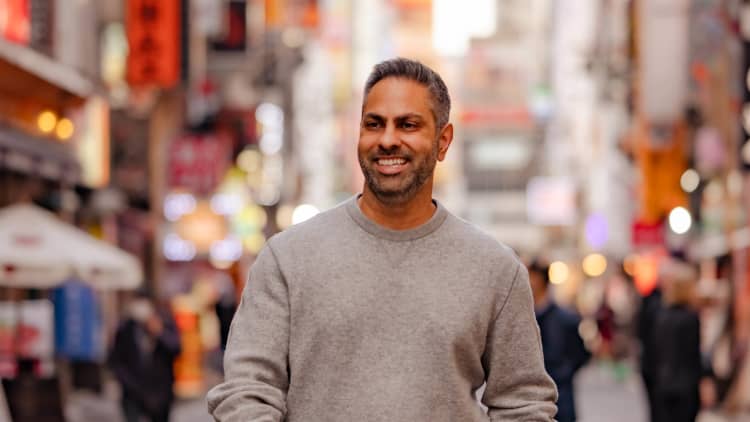Bosses and employees in America don't seem to be getting along particularly well these days.
From CEOs delivering attention-grabbing rants in all-staff meetings to the Hollywood writers' strike, it's easy to feel like 2023 is the year of breakdowns in communication between leaders and their colleagues.
"We're in a crisis of trust in leadership," Sandra Sucher, a Harvard Business School professor who studies layoffs and trust, tells CNBC Make It. "Leaders of all kinds ... are failing some of the basic expectations that people have for how they should be treated."
But some experts say the problem is years in the making — particularly the past two years, as many U.S. workers started requesting better treatment from employers in return for their time and energy.
That tension might be finally exploding as some companies attempt to course-correct their mid-pandemic decisions, Sucher says. Businesses that over-hired are conducting layoffs. Managers who allowed employees to work from home are demanding people return to the office.
"The past two years revealed the leaders who are truly focused on the well-being of their workers, versus the ones who are focused on the bottom line," says Anthony Klotz, an associate professor of management at University College of London who coined the term "Great Resignation."
There's a simple way to tell the difference between those two types of bosses, experts and CEOs alike say: Pay attention to how they communicate.
Good bosses proactively tell the truth
For Tiffany Kelly, the key to effective communication is simple.
"People want you to ... be as transparent as you can. Be emotional, speak from your gut. People just don't want to be led astray or lied to," says Kelly, 28, the CEO and founder of fitness content startup Curastory.
Since Kelly launched Curastory in 2021, she's built a 25-person remote team and closed a $5 million seed extension fundraising round. In that time, she's learned that her workplace is happier and more productive when her employees demand transparency from her.
She tells a story of one of her earliest employees, who began to have doubts about the company's direction after talking with a group of ex-staffers. When the employee confronted Kelly, she decided to show him "the full picture," she says — from key data points to her rationale for various business decisions.
Kelly got emotional during the conversation, which helped the two of them bond, she says: "He respected that." She's now transparent about company data and decisions with her entire staff, she adds.
Of course, transparency can be a double-edged sword. Office furniture company MillerKnoll CEO Andi Owen went viral last month for telling her employees how she really felt — that they should "leave Pity City" and focus on their work instead of whether they'll get a bonus this year.
Owen has reportedly apologized since: "I feel terrible that my rallying cry seemed insensitive," she wrote in an all-staff email, according to CNN.
There's no such thing as a "one size fits all" way of talking to people, Kelly says — rather, whether you're a junior-level employee or the CEO, meet people where they are. Showing her full emotional range to her one employee might not have worked with someone else, she notes.
"People communicate differently," says Kelly.
Effective leaders listen before speaking
Leon Ford suggests a second tip for leaders: Talk less, listen more.
Ford, 29, is a founder and chair of The Hear Foundation, a police reform nonprofit in Pittsburgh. The foundation's 40-person board ranges from activists and supporters of the Black Lives Matter movement to supporters of the Blue Lives Matter movement, including actual police officers.
The group doesn't always see eye to eye, and it's Ford's job to direct conflicting interests into meaningful and actionable policy suggestions, he says.
"It's frustrating when someone has a perspective about someone else's issue that they don't fully understand, and they just speak from their personal lived experience without leaning into the lived experiences of other people," says Ford.
The past two years revealed the leaders who are truly focused on the well-being of their workers, versus the ones who are focused on the bottom line.Anthony KlotzAssociate professor of management, University College of London
For managers, this can be a challenge: The more power you gain, the more empathy you tend to lose, found a 2019 study in the academic journal Frontiers in Psychology.
That means you need to actively work to understand the nature of your colleagues' day-to-day tasks. Kelly says she does this by working "in the trenches" alongside her employees, often on weekends. She also says she doesn't have the highest salary at the company, and that her employees are aware of it.
If you're not the boss, the lesson is clear: Don't be afraid to voice your interests and needs. You can change your workplace when you "speak up" and share ideas based on your day-to-day experience, Klotz says.
But that only works when leaders "dedicate more time to listening to workers," he adds. "In those situations, speaking up will only get you so far, and you may need to focus on your own well-being until that person moves on or you can switch to a better situation."
DON'T MISS: Want to be smarter and more successful with your money, work & life? Sign up for our new newsletter!
Get CNBC's free report, 11 Ways to Tell if We're in a Recession, where Kelly Evans reviews the top indicators that a recession is coming or has already begun.



